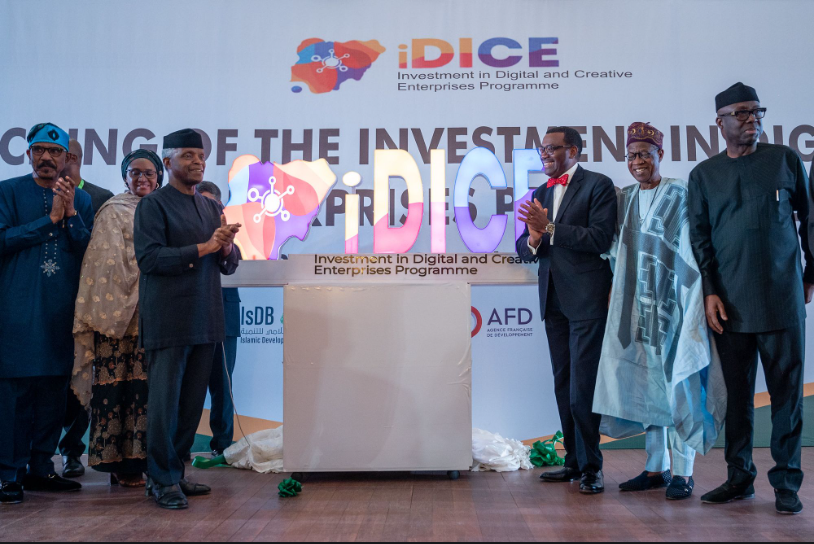On Tuesday, March 14, 2023, the Vice President of Nigeria, Prof. Yemi Osinbajo, launched the Investment in Digital and Creative Enterprises (iDICE) programme at the state house conference centre in Abuja, Nigeria.
Since the programme’s launch, there has been some confusion around important details such as the programme’s name, the total amount invested, and the partners involved.
In this article, we intend to simplify the announcement by leveraging information from the involved parties’ live speeches and press releases.
What is iDICE?
The programme’s name is iDICE, an acronym for Investment in Digital and Creative Enterprises.
The iDICE aims to provide financial and non-financial support to startups emphasising job creation.
“The programme is a government initiative to promote innovation and entrepreneurship in the digital, technology and creative industries and is especially targeted at job creation”, according to the Vice President of Nigeria, Prof. Osinbajo.
The African Development Bank (AfDB) is the initiative’s largest single funder. It will look to roll out a similar iDICE model to other regional member countries, the 54 independent African countries. It will do this through its Youth Entrepreneurship Investment Bank initiative.
In Nigeria, the executing agency for the iDICE program is the Bank of Industry, the country’s oldest and largest Development Finance Institution currently operating.
What’s the size of the iDICE fund, and who are the funders?
According to an official statement by the African Development Bank, the size of the fund is $618 million.
The fund comprises:
- $170 million from the African Development Bank (AfDB) and
- $116 million (€100 million) from the French Government through its development agency—Agence Française de Développement.
- $70 million from the Islamic Development Bank, subject to approval from its board
- $45 million from the Bank of Industry, representing the Federal Government of Nigeria. The BoI’s fund will come as loans to qualifying startups
- $217 million mobilised from other institutional and private investors by an independently-managed venture capital fund tagged DICE fund.
That said, adding all the numbers we quoted above will yield the $618 million quoted by the Presidency of Nigeria and the AfDB.
Who is the iDICE fund for?
The iDICE fund is for:
- young Nigerians between the age of 15 and 35 years,
- building startups or micro, small and medium enterprises (MSMEs) or enterprise support organisations (ESOs)
Examples of ESOs include hubs, accelerators, venture capital and private equity firms.
Why the iDICE fund?
There are three major objectives of the iDICE fund. They include:
- providing access to financial support for startups and MSMEs
- providing non-financial support e.g. mentoring to beneficiaries
- boosting the economy and creating jobs
According to the Vice President, this fund will bolster the growth of the country’s multi-billion dollar tech ecosystem and the creative industry.
Last year, Nigerian startups raised well over 20% of the total venture capital investment in Africa. Local and foreign private investors mostly made these investments.
“This influx of private capital has enabled start-ups to expand operations and create new jobs while contributing significantly towards our own GDP growth,” Osinbajo added.
For context, the Information and Communication sector grew by 19% in 2022 and contributed 10.61%, in nominal terms, to the GDP of Nigeria. In comparison, the Oil sector declined in growth terms and contributed only 5.67% to aggregate GDP in 2022.
Thus, continuing to spur the ICT sector to even greater growth is important. “It is now imperative to commence a coordinated approach towards innovation on the continent, bringing together all stakeholders to coordinate efforts at scaling up investments and building programmes that provide the right enabling environment and produce talent pipelines that support the growth of innovation on the continent”, says Osinbajo.
The iDICE programme can generate up to $6.4 billion for Nigeria, according to estimations by the AfDB.
“The benefits of the program to Nigeria’s economy are projected to be worth $6.4 billion.” — AfDB President, Akinwumi Adesina
According to the African Development Bank’s President, Dr Akinwunmi Adesina, the iDICE programme will create 6.1 million direct and indirect jobs and equip more than 175,000 young people with technology and creative skills. The programme will support about 451 technology startups, 226 creative enterprises, and 75 enterprise support organisations.
In addition, a startup-focused programme like iDICE will strengthen and complement other advancements in the startup space.
According to AfDB, “iDICE will also enhance regulatory policy frameworks such as the 2022 Nigeria Startup Act, provide access to financing through the creation of a DICE Fund, an independently managed venture capital fund; and mobilise over $217 million in investment capital. The fund will also provide technical resources to de-risk digital and creative companies at a scale and sustainable manner.”
Microsoft has also committed to supporting the programme, according to Prof. Osinbajo. They will provide “technical assistance, knowledge sharing and capacity building, particularly focusing on the talent pipeline.”
What next for the iDICE model in Africa?
The AfDB will look to replicate this across other member countries.
Dr Adesina says that the iDICE model will be rolled out in other regional member countries through AfDB’s Youth Entrepreneurship Investment Bank initiative, designed to create a financial and non-financial services ecosystem to support startups run by young Africans and to create jobs.
How do I participate in the Nigerian iDICE programme?
Today, it’s unclear how a startup or small business can partake in the iDICE programme. We will continue to monitor the programme’s progress and update our publications as at when due.
References include:
- The AfDB speech delivered by Dr Akinwumi Adesina, President of African Development Bank Group, on March 14, 2023, at the programme’s launch in Abuja
- The Nigerian Vice President, Prof. Yemi Osinbajo’s Speech at the iDICE launch.
- Press release from the AfDB, post-launch event.
Get passive updates on African tech & startups
View and choose the stories to interact with on our WhatsApp Channel
Explore




